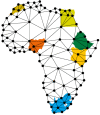What is next in African neuroscience?
- PMID: 35731202
- PMCID: PMC9217128
- DOI: 10.7554/eLife.80488
What is next in African neuroscience?
Abstract
Working in Africa provides neuroscientists with opportunities that are not available in other continents. Populations in this region exhibit the greatest genetic diversity; they live in ecosystems with diverse flora and fauna; and they face unique stresses to brain health, including child brain health and development, due to high levels of traumatic brain injury and diseases endemic to the region. However, the neuroscience community in Africa has yet to reach its full potential. In this article we report the outcomes from a series of meetings at which the African neuroscience community came together to identify barriers and opportunities, and to discuss ways forward. This exercise resulted in the identification of six domains of distinction in African neuroscience: the diverse DNA of African populations; diverse flora, fauna and ecosystems for comparative research; child brain health and development; the impact of climate change on mental and neurological health; access to clinical populations with important conditions less prevalent in the global North; and resourcefulness in the reuse and adaption of existing technologies and resources to answer new questions. The article also outlines plans to advance the field of neuroscience in Africa in order to unlock the potential of African neuroscientists to address regional and global mental health and neurological problems.
Keywords: Africa; Child development; impact of climate change; mental and neurological health; neuroscience; none; research capacity; research strategy; scientific communities.
© 2022, Donald et al.
Conflict of interest statement
KD, MM, NP, CN, WM, AA, MB, RS, AW, NW, AW, SK, AF, DS, AI, WD, CN No competing interests declared
Figures


References
-
- Farrer LA, Cupples LA, Haines JL, Hyman B, Kukull WA, Mayeux R, Myers RH, Pericak-Vance MA, Risch N, van Duijn CM. Effects of age, sex, and ethnicity on the association between apolipoprotein E genotype and Alzheimer disease: A meta-analysis. JAMA. 1997;278:1349–1356. doi: 10.1001/jama.278.16.1349. - DOI - PubMed
Publication types
MeSH terms
Grants and funding
LinkOut - more resources
Full Text Sources

